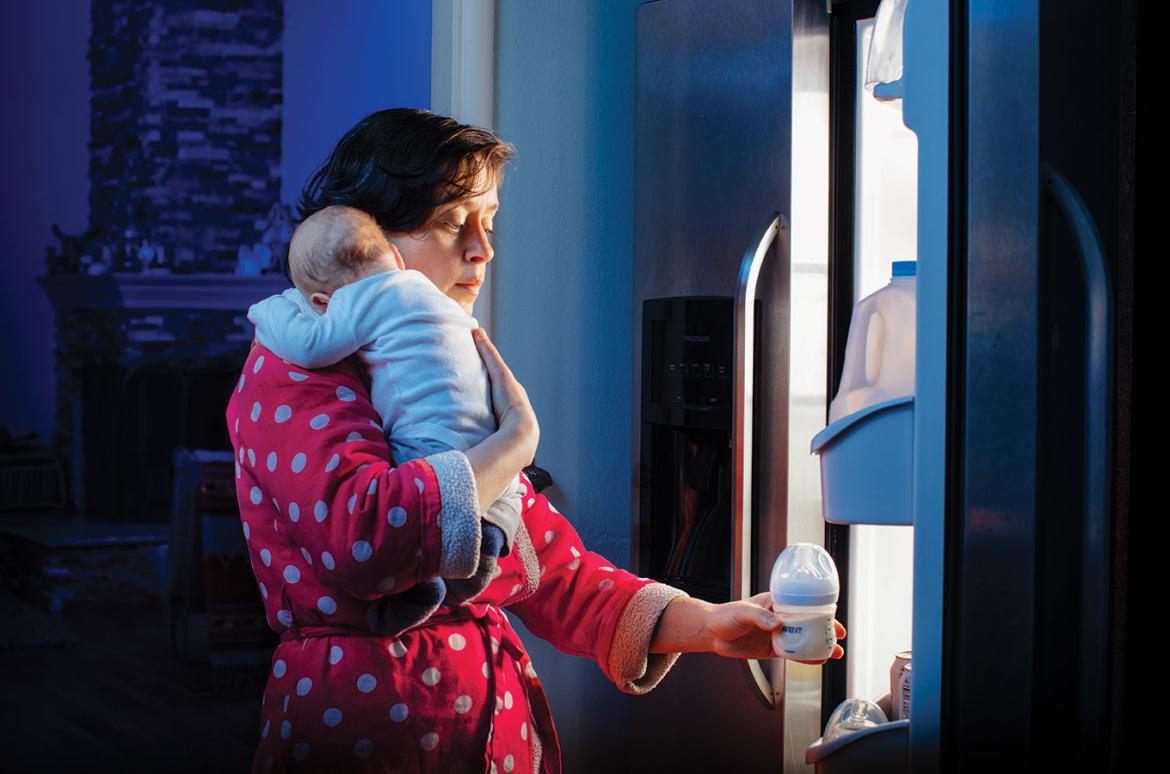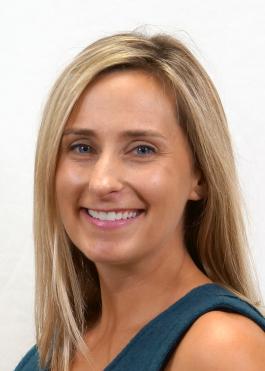By Cyril Manning | This article originally appeared in UCSF Magazine

Clinical psychologist Jennifer Felder, PhD's research focusing on new and expectant mothers has shown promising results in addressing depression by helping patients improve their sleep. [Photo: Elena Zhukova/UCSF]
If you’re having trouble sleeping, you’re not alone. The fear, loss, isolation, and exhaustion of living through a pandemic — alongside a fire hose of economic, political, and racial traumas — have upended the peaceful slumber of millions of Americans. That’s worrisome because insomnia goes hand in hand with anxiety and is often associated with depression.
Department of Psychiatry and Behavioral Sciences assistant adjunct professor Jennifer Felder, PhD, is a clinical psychologist whose research has focused on new and expectant mothers Her work has shown promising results in addressing depression by helping patients improve their sleep.
“In my work with patients and in my research, a lot of pregnant and postpartum women have told me their depression was triggered by sleep deprivation,” Felder says. She decided to evaluate whether cognitive behavioral therapy for insomnia (CBT-I) could improve her patients’ sleep. Although CBT-I has been shown to help three-quarters of people with insomnia, there was reason to be skeptical: There are many practical reasons beyond true insomnia why pregnant women often have trouble sleeping, from physical discomfort to the frequent need to pee.
Nevertheless, in a randomized clinical trial of more than 200 pregnant women, Felder found that those who received CBT-I experienced significantly greater improvements in their insomnia symptoms than the other study subjects. “But what was also super exciting,” she says, “is that they also had improvements in their depression and anxiety symptoms. This is important because we were not targeting those symptoms. This was a sleep intervention, but it suggested broader benefits for these women’s psychological functioning and well-being.”
Another promising aspect of Felder’s study was its validation of using digital CBT-I apps such as Sleepio and SHUTi in place of one-on-one sessions with a therapist. The fact that these digital interventions work so well is important, Felder says, “because frankly there aren’t enough trained clinicians to get this effective intervention into the hands of people who need it.”
So, what exactly is cognitive behavioral therapy for insomnia? The intervention can include several components, including breathing and visualization techniques, mindfulness, and biofeedback, but “the biggest hammer of CBT-I,” says UCSF sleep psychologist and fellow Department of Psychiatry and Behavioral Sciences faculty member Aric Prather, PhD, “is time-in-bed restriction.” That means you don’t lie in bed waiting to fall asleep, but instead stay up until sleepiness finally has its way with you. The long-term goal is more sleep, but the near-term path to getting there is often less — but better and uninterrupted — sleep.
“There’s something powerful about when you restrict someone’s time in bed – it leads to more sleep consolidation,” says Prather. “Subjectively, a big bolus of sleep feels better than that same amount of sleep, broken up.”
UCSF sleep specialists recognize that medications can be appropriate for certain patients who can’t sleep, but point out that many primary care physicians are too quick to prescribe them and don’t realize that CBT-I is the gold standard, first-line treatment for insomnia. Sleep specialist Andrew Krystal, MD, often sees patients who are either skeptical of or impatient with the idea of therapy. “Many of them become the most ardent supporters once they experience it,” says Krystal, who is the Ray and Dagmar Dolby Distinguished Professor and Vice Chair for Research in the Department of Psychiatry and Behavioral Sciences. “‘I’m amazed,’ they tell me. ‘I’m sleeping better. I’m not taking any medication. I didn’t believe it was going to work, but it did.’”
About UCSF Psychiatry and Behavioral Sciences
The UCSF Department of Psychiatry and Behavioral Sciences and the Langley Porter Psychiatric Institute are among the nation's foremost resources in the fields of child, adolescent, adult, and geriatric mental health. Together they constitute one of the largest departments in the UCSF School of Medicine and the UCSF Weill Institute for Neurosciences, with a mission focused on research (basic, translational, clinical), teaching, patient care, and public service.
UCSF Psychiatry and Behavioral Sciences conducts its clinical, educational, and research efforts at a variety of locations in Northern California, including Langley Porter Psychiatric Hospital; UCSF Medical Centers at Parnassus Heights, Mission Bay, and Mount Zion; UCSF Benioff Children’s Hospitals in San Francisco and Oakland; Zuckerberg San Francisco General Hospital and Trauma Center; the San Francisco VA Health Care System; UCSF Fresno; and numerous community-based sites around the San Francisco Bay Area.
About the UCSF Weill Institute for Neurosciences
The UCSF Weill Institute for Neurosciences, established by the extraordinary generosity of Joan and Sanford I. "Sandy" Weill, brings together world-class researchers with top-ranked physicians to solve some of the most complex challenges in the human brain.
The UCSF Weill Institute leverages UCSF’s unrivaled bench-to-bedside excellence in the neurosciences. It unites three UCSF departments—Neurology, Psychiatry, and Neurological Surgery—that are highly esteemed for both patient care and research, as well as the Neuroscience Graduate Program, a cross-disciplinary alliance of nearly 100 UCSF faculty members from 15 basic-science departments, as well as the UCSF Institute for Neurodegenerative Diseases, a multidisciplinary research center focused on finding effective treatments for Alzheimer’s disease, frontotemporal dementia, Parkinson’s disease, and other neurodegenerative disorders.
About UCSF
The University of California, San Francisco (UCSF) is exclusively focused on the health sciences and is dedicated to promoting health worldwide through advanced biomedical research, graduate-level education in the life sciences and health professions, and excellence in patient care. UCSF Health, which serves as UCSF’s primary academic medical center, includes top-ranked specialty hospitals and other clinical programs, and has affiliations throughout the Bay Area.






